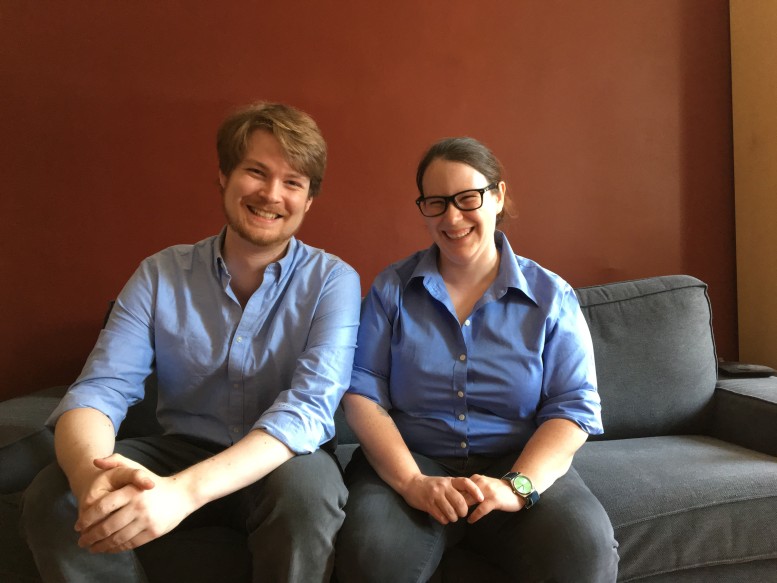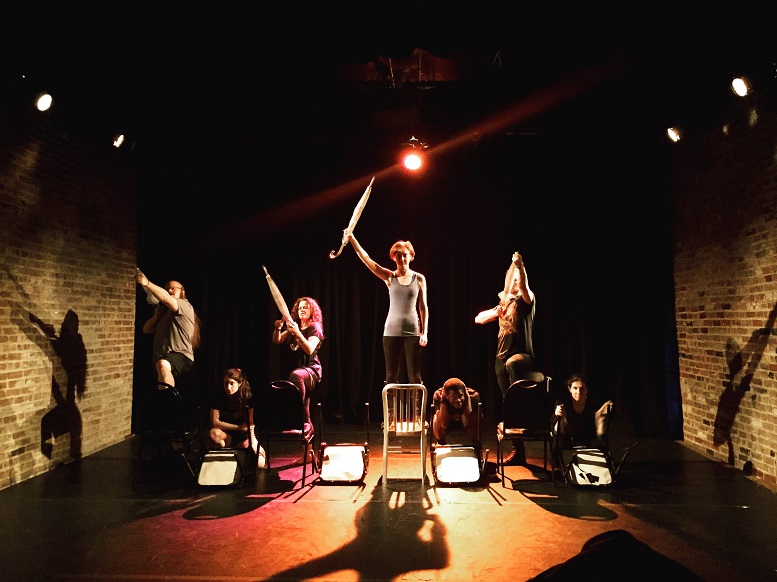Strange Harbor is a Brooklyn-based “exploratory theater company” dedicated to creating experimental adaptations of classic texts, including adaptations of “The Brothers Karamazov” by Fyodor Dostoyevsky and Herman Melville’s “Moby Dick.” Their latest project, “This England: The Complete Kings, 1377-1485 (Abridged)“, adapted from William Shakespeare’s English history plays, is appearing at the Shakespeare in the Theater Festival at the Brick in Brooklyn on August 31st.
HAILEY BACHRACH: To start, why don’t you tell me a bit about the project?
ROSA SCHNEIDER: Sure! So, “This England: The Complete Kings, 1377-1485 Abridged,” is all of the English history plays from “Richard II” to “Richard III,” including the first tetralogy and the War of the Roses. It’s eight actors playing over forty roles. Each actor plays a king, but they also play smaller roles.
HAILEY: How long is it?
ROSA: It’s five acts.
ZACHARY TOMLINSON: As a traditional Shakespeare play is structured in five acts. We have an intermission between acts three and four. Act one is “Richard II,” act two is both parts of “Henry IV,” act three is “Henry V,” then we have our intermission, act four is all three parts of “Henry VI,” and act five is “Richard III.”
HAILEY: I guess there’s two parts to my next question, which is: why present these plays and why do them like this?
ROSA: Well, there’s a two part answer to that. Firstly, we at Strange Harbor — which is me and Zach and our associate artists — are interested in making epic works intimate and intimate works epic. So we have in the past done lots of big works that have been narrowed down to like one play, and we thought that this would a great challenge. Going back a little, I’m sorry — usually these plays are presented in sections — but no one really does it all.
ZACH: Especially not in one evening, under three hours. So the idea came about because we’d been wanting to work at the Brick for a while, and when we saw that they were doing a Shakespeare festival we thought this would be a great opportunity for us to create a Shakespeare play and do it in our style. We’re both big Shakespeare fans and love many different kinds of performing and producing Shakespeare — but we wanted to come up with a way that would be specific to Strange Harbor’s aesthetic and Strange Harbor’s approach which is about adaptation and is a dramaturg-and-director-led process, rather than a playwright-driven process.
ROSA: And so why now! One of the things we were thinking about and we’ve discovered through the process is that in order to get all of this down, unfortunately we’ve had to cut out some fan favorites. Falstaff is gone — the French are gone, practically — but what this reveals is how power changes the kings. And how power gets passed down and the loss of power, how all of that works. And we think that it’s incredibly timely! Not only given the recent events in Britain. We like to call this the original Brexit, in some ways.
ZACH: How England identified itself as a nation separate from Europe. So this is a story about the creation of a national identity, and that nationalism is, I think, really appropriate. To this political climate, something to explore and investigate, as well as how, as you say, power changes people. And that’s something that we get to see with each king over the course of the story, how gaining or losing power, or gaining and losing power, changes each king. And that’s something that you don’t often get a perspective on in each play because you might see someone rising, but not how they then fall later.
ROSA: Another thing about doing all these plays together is that you see how often certain tropes are repeated. One of the things we noticed in rehearsal is that in every single act there’s a king who thinks about what it means to be king. Who addresses the crown and is like, “Why am I the king?”
ZACH: And in our cut, we chose to highlight those monologues, those questions, sometimes at the expense of other plots or narratives.

HAILEY: I’m sure there are people who are reading this, listening to this, and heard that you cut Falstaff and are like, “What have you done?!” What do you think is the value in encountering something that is, for the most part, so well known, and radically transforming it?
ZACH: We’re placing it in a context that is that is rarely accessible outside of scholarship. And we’re taking it in a way that’s not meant to be scholarly, but exciting and dramatic. And it’s also the context that Shakespeare’s audience would have understood these stories.
HAILEY: You’ve done a series of adaptations of classic literature, but this is your first engagement with adapting a play, is that right? How is that different?
ROSA: It’s an interesting difference, I think. Because we do direct adaptation, you know: we take the text and we put it onstage. And Dostoyevsky’s a great writer, he’s one of my favorites, but he’s not dramatic. You know? So we spent so much time being like, “Well, you know, this is a great speech, but this doesn’t do anything for us.”
HAILEY: “How is it a scene?”
ROSA: Exactly! “How can we make this a scene?” And with this, it’s all scenes!
ZACH: The drama’s already there, it’s about identifying what structure you want to isolate. And so in that way, it’s similar, in that we’re looking for a through-line and cutting everything is not necessary to tell that through-line.
ROSA: Dramaturgically, it’s very similar, because what my role has been a lot as a dramaturg has been kind of exactly what we were talking about: does this make theatrical sense? Does the story make sense, does this world make sense?
ZACH: Something else that we’ve thought a lot about both in the cut and in the casting and rehearsal process is the role of gender in the storytelling. Because these plays are already predominantly male stories, it’s about these men holding power, and unfortunately we even had to cut some of the few women who are in the stories, like Lady Percy and Katherine from “Henry V.” Both of whom do not affect the plot.
HAILEY: Why don’t you talk a little bit about your casting? I have noticed from social media you don’t have an all-male cast, you don’t have an all-white cast, even though that sounds sort of like what the character breakdown has become, in that you’ve lost many of the female characters, you’ve lost the lower class characters — so you’re left with basically the aristocratic men.
ZACH: So, we set out from the very beginning to have a cast that was at least 50 percent women, and that’s we ended up with. Four women and four men. We also set ourselves a goal of having a cast that was at least 50 percent people of color, which we did not succeed in doing. To our frustration.
ROSA: But we’re making steps!
ZACH: Yes. But it’s something we’re working on.
ROSA: So yeah, half of our cast is female, female-identified, and they’re not — they are playing men, I guess?
HAILEY: You didn’t change the pronouns.
ROSA: No, no, we didn’t change the pronouns.
ZACH: When they’re playing men they’re playing men. And when they’re playing women they’re playing women. We tried to make it so there was a great deal of variation in women and men playing the kings. We do have, also, one instance where a male actor plays a female character. And that was an intentional thing because we want to say not just that women can play men, but that gender is not a determining factor in what roles can be played by whom.
HAILEY: Do you have any concluding thoughts?
ROSA: One of the things that we found in rehearsal that I was really surprised at, is that it’s not doom and gloom at all. You know of course there’s… there is serious moments, there is tragedy, but there’s a lot of comedy that comes out.
ZT: Oh, we didn’t even talk about the umbrellas, actually!
ROSA: Oh, yes! So because we have such a sprawling — you know, over a hundred years of history lots of different factions, we’ve gone with a very simplistic kind of design. But what’s really cool, and I think is kind of our best invention is that we use umbrellas as swords.
ZACH: I think that this is something that’s emerging, is having an object that is sort of the significant object of the production. And for this, the umbrellas, I think our experience of this — not just the fact that England is very rainy, but that it it’s about weathering these storms. That there are these continual disasters and so the blood, the blood that is flowing throughout the show — using them as swords I think was a way to engage with the very physical nature of the violence without trying to create something that was meant to be historical in a limiting kind of way.
ROSA: Right. Yeah. ‘Cause I think that’s one of the things we struggled with the most, is like how historical do you want this to be?
ZACH: If we were gonna try to be very specific and accurate, which is sort of a non-realistic way of approaching Shakespeare anyway — it would place a barrier between the play and the audience. And by asking the audience to use their imaginations and suspend their disbelief from the very beginning, I think we’re bringing them into the world of the play and allowing them to create it rather than us saying, “Here is, you know — ”
ROSA: “Here is England.”









